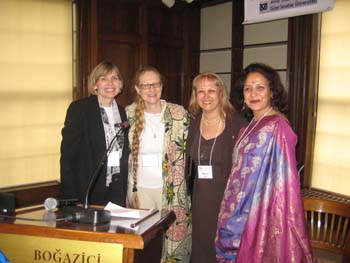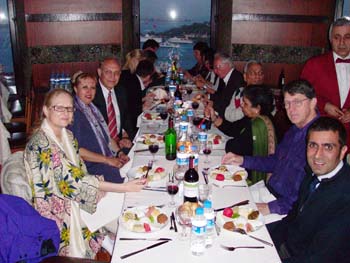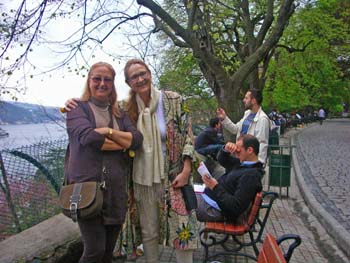Newsletter Nr. 15 (May 2010, subsequent to our 15h Annual Conference of Human Dignity and Humiliation Studies in Istanbul, Türkiye, 28th-30th April 2010)
Compiled by Evelin G. Lindner, in 2010
See the final report of the conference (English and Turkish)
Contents
• Pictures
• Thanks!
• Your feelings and reactions after our conference
• Papers
• Announcements and Good News
• Welcome Again!
Pictures
(Important note to our conference particants: During our conferences, we always make an effort to ask for your permission to have your pictures posted on this website. However, you may have overheard or misunderstood our question, or you may have changed your mind since, either in total or for specific pictures/videos, please let us know! Thank you! Since we wish to walk the talk of dignity, it is very important for us to do our utmost in respecting everybody's privacy. We refrain from gathering written permissions from you during our conferences, since we value the building of mutual trust in relationships, and we also would like to refrain from contributing to an ever more bureaucratic and legalistic society.)
|
|---|
On 28th April 2010, on Day One of the conference, Dr. Kadri Ozcaldiran, Rector of Boğaziçi University welcomed everybody. |
28th April 2010, Gala Dinner at the Vakiftepe (Social Building) of the Istanbul Technical University, overlooking the Fatih Sultan Mehmet bridge. • Please click on the picture on the right or here to see all the photos from Sophie Schaarschmidt's camera. |
29th April 2010, Bosphorus Boat trip with fish and bread, supported by the Sariyer Municipality. We extend our warmest thanks! • Please click on the picture on the left or here to see all the photos from Evelin's camera. • Please click on the picture in the middle or here to see all the photos from Hayal's camera. • Please click on the picture on the right or here to see all the photos from Sophie Schaarschmidt's camera. |
30th April 2010, Public Event on Day Three of the conference. • Please click on the picture on the left or here to see all the photos from Evelin's camera. • Please click on the picture in the middle or here to see all the photos from Hayal's camera. • Please click on the picture at the bottom or here to see all the photos from Linda's camera. |
30th April 2010, after the Public Event on Day Three of the conference, we enjoy the
Covered Bazaar and a special Open Space Session on the dignity (or the lack of dignity) in contemporary economic arrangements with Nebil Basmaci. • Please click on the picture or here to see more photos from Linda's camera. |
30th April 2010, after the Public Event on Day Three of the conference, we enjoy the
Covered Bazaar and the Galata Tower dinner. • Please click on the picture or here to see more photos from Linda's camera. |
1st May 2010, Kilyos hotel. • Please click on the picture or here to see more photos from Linda's camera. |
1st May 2010,
Sultanahmet Circle with German Fountain, Column of Snake, Blue Mosque, St. Sophia Palace and Mosque. • Please click on the pictures at the top or here to see all the photos from Evelin's camera. • Please click on the picture in the middle or here to see more photos from Linda's camera. • Please click on the picture further down or here to see all the photos from Sophie Schaarschmidt's camera. • Please click on the picture at the bottom or here to see all the photos from Ardian Adžanela's camera. |
2nd May 2010,
Turkish hospitality! Hayal Köksal opens her home, and we say good-bye to dear Arif at Kilyos! • Please click on the pictures at the top or here to see all the photos from Evelin's camera. |
|
|---|
On 20th April 2010, after 4 nights being stranded in Amsterdam, Evelin finally arrived in Istanbul, lovingly welcomed by Hayal Köksal, the unbelievably caring and skilled convener of our conference. |
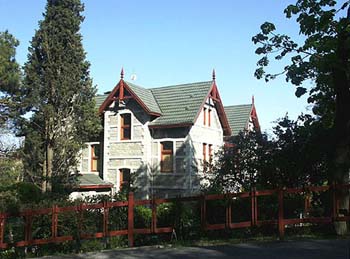 |
| Kenney Lodge, overlooking the Bosphorus, in between two bridges (Fatih Sultan Mehmet bridge in the north and Bogazici bridge further south). Please click on the picture above or here to see more photos. |
    |
| On 21st April 2010, Hayal introduced me to her students at Boğaziçi University. Afterwards, Hayal invited me to the Vakiftepe (Social Building) of the Istanbul Technical University, overlooking the Fatih Sultan Mehmet bridge. There, we worked on the programme of our conference! • Please click on the pictures at the top or here to see more photos from Evelin's camera. • Please click on the pictures at the bottom or here to see more photos from Hayal's camera. See also Hayal's blog! |
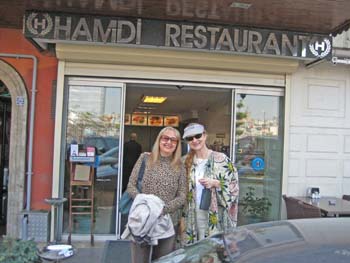  |
| On 23rd April 2010, Hayal took me around in Istanbul, from the Children's Day celebrations to the Hamdi restaurant, and the tulips of Turkey. Please click on the picture above or here to see more photos from Hayal's camera. |
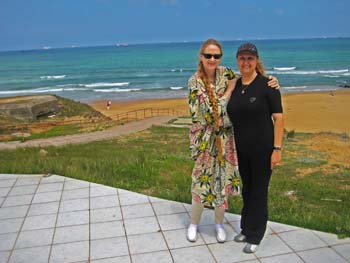 |
| 25th April 2010, after a wonderful weekend at Hayal's home, she took Evelin to see Kilyos hotel. Please click on the picture above or here to see more photos from Hayal's camera. |
 |
| 26th April 2010, first arrivals! See Linda Hartling, Rick Slaven, and Ardian Adžanela. Hayal Köksal and her students (see Uğur Akgün and Salim Ergene on these pictures) helped wherever they could. See also Arif, who wonderfully cared for us in Kilyos hotel! Thank you to you all!!! Please click on the picture above or here to see more photos from Evelin's camera. |
   |
| On 27th April 2010, Vineeta Kamran was among the first to arrive, and also Younis Al Khatib, President of The Palestine Red Crescent Society joined us. • Please click on the picture on the left or here to see more photos from Evelin's camera. • Please click on the picture in the middle or here to see more photos from Hayal's camera. See also Hayal's blog! • Please click on the picture on the right or here to see more photos from Linda's camera. |
Dear Friends! Thanks!
We had a wonderful conference in Istanbul, Turkey!
Our 15th Annual HumanDHS conference was overwhelming and unique. Linda and I would like to begin by sharing with you our deep gratitude for joining us in making this one of our most special and mosst memorable conferences. Everyone participated by not only offering special presentations but also engaging in stimulating and thought-provoking conversations.
We are especially grateful to our host, organiser, and convener, Hayal Köksal. We are deeply grateful for her leadership and support that she extened to us together with her esteemed husband Servet. For years prior to our conference, throughout the entire conference, and after our conference, she was the caring hand that held us all together. Hayal never forgot even the smallest detail. All she did, from her amazing pre-conference preparations, to her wonderful gifts in kind that she made possible for our participants (such as a gala dinner, or a Bosphorus Boat tour, to name but two such gifts), to her deeply reflective comments and discourses, were beyond all our expectations. We were simply blown away. Her loving presence was extraordinary. And, to round up our compliments for her, let us not forget the delicious food she and her husband cooked for us!
More thanks go to Uğur Akgün, Riza Memiş, Murat Altıntaş, and Salim Ergene, Hayal Köksal's most diligent and attentive students, who supported our conference with a care and dedication that we have not seen so far. Also Arif deserves our deep thanks! He made us feel at home in Kilyos hotel! And let us also not forget Murat of Fora Tourism.
Richard Slaven deserves our special gratitude. He always stays in the background, very humbly, while making major contributions. He is the compassionate 'invisible hand' that is crucial for our conferences. What would our conference have been without his humorous-relational hugs! The care and love that Rick invests in relationships, always make our meetings very special.
We want to furthermore thank all our participants for their breathtaking excellence in scholarship, intellectual insights, and their deep passion for taking action and building relationships!
We would like to invite everybody to contribute to this newsletter with your reflections (see further down)! We invite comments and thoughts both from the participants, and from those who were with us in spirit! And please send us your pictures to upload!
This is Linda's summary of our conference to her colleagues at the Jean Baker Miller Training Institute (24th May 2010): 'The two-day closed part of the conference involved network members from 13 countries, including Bosnia-Herzegovina, Czechoslovakia, Palestine, Israel, Ireland, England, India, Germany, Norway, Canada, and Argentina! These members are working in diverse fields, e.g., education, peace education, technology development, trauma care, immigration/displacement, and human rights. We had with us the principal of one of the largest schools in India, the President of the Quality and Peace Education Center in Turkey, the Director of the Center for Global Morality in London, a representative from the Slovak Republic Government Office Department of Human Rights and Minorities from Bratislava, Slovakia, and the President of Palestinian Red Crescent (the Red Cross). It was an AMAZING group of people (that gathered despite having to navigate their travels around an active volcano)! Our Public Event on the last day of the conference was half presented in English and half in Turkish. We used headphones to hear translations of the presenters' talks. It worked beautifully!'
May we extend our very warmest thank-you to ALL!
There are no words to express our appreciation for your amazing contributions!
Evelin & Linda, on behalf of our entire network, 2010
PS from Linda, Rick and Evelin on unity and diversity and the metaphor of a tree:
Our conferences involve a commitment to relationship building and engagement, not just as researchers or practitioners but also as human beings. This is what we mean when we use the metaphor of a tree for our work and speak of developing the roots and the trunk of the tree of our work! The trunk is held together by relationships. All of you did a magnificent job in presenting yourselves in ways that encouraged engagement. This is among the most important parts of the process. We are so grateful for your courage, because it is not always easy to step out of the security of conventional academic conference models and jump into the stream of uncertainty associated with a living dialogue.
Thank you, dear Hayal, for sending us wonderful images of trees that illustrate our metaphor! Your images show so very impressively the diversity of how our tree metaphor can manifest itself in reality!
Zuzana Luckay kindly commented (11th May 2010): 'Let me point out that if the network is a tree... What do trees need the most? Which direction do trees grow? What is infinite and all embracing? What shows the direction out of darkness? What is everywhere yet nowhere?
What gives endlessly without caring about a return? LIGHT
What is the source of light? THE SUN
If the tree is the network, it needs water from the earth, the veins of the tree spread the blood to all its parts, some leaves fall off but they only return to earth and feed other trees, they are also needed.
We, the network, make the molecules of the water move, we feed it with our active power, but the tree needs also the sun, the rays of which it photosynthesis, this process alone can turn light into food for the tree. Our ideas are similarly processed into sustenance, a source of energy for us, and we become the tree, our IDEAs, our lives...turn back into the vast circle of life in which every leaf, every ray of sun, every branch have a place. This process on earth is powered by the sun. But we are 'only' human, you, me, all the members, our bodies are finite, but our ideas are not, our ideas become sustenance for life and eventually light and light will shine even when our corpses are gone ..'.
Dear Zuzana kindly offers people who pick up on her comment to write to her to find the rest of the puzzle! Because there are more questions to be asked, she wrote, such as: 'Why, one tree? Well there will be many, the HumanDHS homes ... Why a home? Ideas need a home to grow... And then the metaphor is truly built jointly. Questions arise when people are brave enough to answer so I would 'advertise' (positive +) this puzzle in a section on COURAGE'.
This conference brought together a diverse array of thoughts and practices. All participants contributed as leaders in their fields, as trees in their own account so-to-speak, and at the same time as branches on our tree of Human Dignity and Humiliation Studies.
Thank you for making this conference such a special experience of collaboration, co-creation, and meaningful connection!
The idea was aired at the end of our conference to create an edited book that brings together the various topics of our conferences, topics that all speak to dignity and humiliation. We invite you warmly to take this idea and develop it! Who would wish to serve as editors together with dear Linda?
What Linda and I take from this conference is a reminder that we have to always be aware that those participants who join us for the first time are not yet familiar with our approach. We need to make a point in continuously explaining the basics of our orientation.
Linda opened our conference by pointing out that our aim is creating a humiliation-free, collaborative learning environment characterised by mutual respect, mutual empathy, and openness to difference. The perspective of 'appreciative enquiry' is a useful frame of our work. Our HumanDHS efforts are not just about the work we do together, but also about HOW WE WORK TOGETHER. At appropriate points during our conferences, for example at the end of each day, we take a moment to reflect on the practices observed that contributed to an appreciative/humiliation-free learning experience.
It is important to emphasise that an appreciative approach is not about expecting people to agree. In fact, differences of opinion enrich the conversation and deepen people's understanding of ideas. Perhaps, this could be conceptualised as 'waging good conflict' (Jean Baker Miller), which means practicing radical respect for differences and being open to a variety of perspectives and engaging others without contempt or rankism (Robert Fuller). As we have seen in many fields, contempt and rankism drain energy away from the important work that needs to be done. Most people only know 'conflict' as a form of war within a win/lose frame. 'Waging good conflict', on the other side, is about being empathic and respectful, making room for authenticity, creating clarity, and growth.
Furthermore, we need to emphasise that we believe that part of bringing more dignity into our world is to highlight process rather than fixity. Unity in diversity is a motto that opens space for diversity of views to come together in processual ways. Our collaborative work is ever-evolving, a 'work in progress'. For example, we do not have, or do not advocate, any fixed definitions or interpretations of dignity and humiliation, but wish to celebrate the richness of approaches to these concepts that are available in different cultures. Unity means to create a safe space for diversity and process.
'Listening into-voice' is a phrase that speaks to this point. Linda M. Hartling explained it as follows (2009): 'The expression 'listening into voice' draws our attention to the fact that human communication is a bi-directional experience. It is a phrase that encourages us to attune to the fundamental relational nature of speaking. It reminds us to look beyond the individualist myth that speaking is a one-way experience in which the speaker is solely responsible for communicating effectively. Speaking is interactive. It is a two-way experience in which both (or all) people participating in the relationship can chose to listen and engage in a way that will help others to effectively express and clarify their ideas'.
The fluidity and process of our approach is also reflected in the way our conferences manifest. In our outside-of-NY conferences, for example, we always start out with more than 100 people being interested in attending, and finally, in addition to a varying number of local participants, about 15 to 20 international participants join us (in NY, we have usually around 65 participants). It is a major commitment to take the trouble and shoulder the cost for a flight and for housing. Our decision to put people first - to have money 'serve rather than lead' our work - means that people do not feel obliged to attend because of monetary motivations (neither in form of a registration fees, nor in form of scholarships). We include all participants on our conference web pages, those who attended in person, and those who attended in spirit.
Unity in diversity helps us dignify relationships. During our conference, we experienced wonderful loving togetherness, which our participants expressed in a vastly diverse ways. Linda and I, we would like to send you our heart-felt loving thank-you!PS from Linda, Rick and Evelin on our outreach and our financial situation:
We (Linda, Evelin, and our Core Team) have learned that fundraising and employing staff is not feasible in the context of our mission, that also finding volunteers and including them too fast may not be in line with the spirit of our work (both approaches reflect mainstream expertise). We are currently building a team of volunteers in a very long-term and sustainable manner.
As to our outreach, we have learned, since 2003, to be cautious in growing our network too hastily. We wish to do thoughtful groundwork. We would like to invite you to share our efforts. Since we are not a monolithic top-down organisation, but a network of concerned citizens, we need your help with growing our work in dignifying ways that preserve our integrity of 'walking our talk'.
As to our financial situation, we (Linda, Evelin, and our Core Team), since 2003, in ongoing dialogue with a large number of people who are knowledgeable with finances (see our article 'Dignity or Humiliation in Economic and Monetary Systems: Toward a System of 'Right Relationships''), have developed very clear guidelines for how we wish to approach our work. We observe that current economical arrangements have systemic humiliating effects, and therefore we wish to transcend them. Our aim is to place dignity at the core of our work, not just theoretically but also in practice, including our financial practices, rather than give primacy to the profit maximisation motive.
Based on first-hand experience, we have learned that even well-intended non-profit organisations can be driven by a profit motive, which seriously compromises the integrity, quality, and intentions of the work. This informs the important choices that we make about how to manage and develop economic resources.
For example, requiring conference participants to pay a registration fee may initially appear to be a solution for reconciling conference expenses. However, this approach risks humiliating those who do not have the economic resources to pay and it risks creating the humiliating consequences of hosting a conference for only those who can pay. We believe we can do better!
At this particular conference we practiced an alternative methodology. We made conference expenses transparent to all and we invited participants to contribute to the real costs of the conference by giving 'according to ability' (see more further down). To our delight, our experiment in transparency and shared responsibility allowed us to collaboratively reconcile the costs of the conference through dignifying dialogue! This was another example of how people united in 'right relationship' generate the real wealth of our HumanDHS work! Thanks to everyone!
As we move forward with finances in the future, we hope all network members know that we gladly welcome and greatly appreciate personal contributions to HumanDHS, in particular, to our Global Education Fund! We are profoundly thankful to be building a community that has a deep understanding of how money can humiliate.
We would also like to thank you in advance for your patience and support when we wish to heed the saying by Eric Hoffer 'In times of change, the learners inherit the world, while the learned find themselves beautifully equipped to deal with a world that no longer exists' (see also Ray and Anderson's reflections on methods). Finding new ways and creating new realities, even if ever so tentatively, is always a difficult endeavour. Your patient support is invaluable to us!
PS: Financial report by Rick Slaven, 'contributing according to ability':
At this particular conference we practiced an alternative economic methodology. We made conference expenses transparent to all and invited participants to contribute to the costs of the conference by giving 'according to ability'.
To our delight our experiment in transparency and shared responsibility allowed us to collaboratively reconcile the costs of the conference! We are deeply encouraged by this example of how people united in 'right relationship' generate real wealth for the good of all! Thanks to everyone for making this dignifying economic model work so well!
We asked our participants to contribution 80 TL, more or less, according to their ability. This worked out quite well. 1,470 TL was contributed; 1,460 TL from participants and 10 TL from lunch on Saturday. This means we covered all but 130 TL (65 euro) of our cost, and we are expecting one more contribution.
We feel that this conference was our best example of our ongoing efforts to co-create a truly dignifying conference economy! Bravo to all of us!
Thank you again for participating in our Istanbul meetings. It was a wonderful three days, with so many meaningful moments and so many lasting relationships made.
With respect and caring.
Rick
Financial Scorekeeper
Linda Harting added: We might want to adopt the idea of 'contributing [investing] according to ability' as a ongoing philosophy, methodology, and way of 'doing business'. This wouldn't just be for financial contributions but for all contributions of time and energy! Indeed, it seems like we are already doing this in many, many ways!
PS from Evelin on quantum social science and the reflective equilibrium:
After one of the conference's conversations, I promised to share two thoughts related to process versus fixity, one on quantum social science, and one on the reflective equilibrium. Here they come:
Quantum social science (see more explanations in my articles and books):
'We know we have experience from, well, experience itself, but there is no apparent way to reconcile this fact with modern science. By rights it seems consciousness should not exist, and as such neither should meaning, which presupposes consciousness”(*). Alexander Wendt, social constructivist scholars in the field of international relations, suggests that a quantum connection, justifying a 'participatory epistemology' in social inquiry, would give additional force to critiques of the subject-object distinction, such as post-modernists or feminists.(**)
(*) A. Wendt, Social Theory As Cartesian Science: An Auto-Critique From a Quantum Perspective (Columbus, OH: www.humiliationstudies.org/documents/WendtAutoCritique.pdf, 2004), 10, an early text in preparation for S. Guzzini and A. Leander, Constructivism and International Relations: Alexander Wendt and His Critics (New York: Routledge, 2006).
(**) Ibid., 7.
Reflective equilibrium (see more explanations in my doctoral dissertation):
As appropriate epistemological orientation, philosopher Dagfinn Føllesdal(*) suggests the reflective equilibrium, or circular thinking(**), which has been en vogue since the 1950s. Prior to that time, thinkers preferred to build their arguments from the ground up, placing each layer of logic firmly on the previous foundation. They were committed, in other words, to building their ships on secure ground. They could not conceive of “building their ships at sea” as do the modern practitioners of reflective equilibrium. Reflective equilibrium, therefore can be described as a humble method of reasoning that avoids the hubris of trying to do the impossible or call for the impossible to be possible—an approach fitting for the humble dismantling of hierarchies of submission/domination that human rights stand for.
(*) For his publications see, for example, D. Føllesdal, 'Husserl on Evidence and Justification', in Edmund Husserl and the Phenomenological Tradition: Essays in Phenomenology. Proceedings of a Lecture Series in the Fall of 1985, in Studies in Philosophy and the History of Philosophy, ed. Robert Sokolowski (Washington, DC: Catholic University of America Press, 1988), 107-129, and D. Føllesdal, Intersubjectivity and Ethics in Husserl's Phenomenology (Oslo: Seminar organised by the Norwegian Ethics Programme at the Research Council of Norway, Oslo, February 19-24, 1996).
(**)D. Føllesdal, How Can We Use Arguments in Ethics? (Oslo: Presentation at Det Norske Vitenskaps-Akademi [Norwegian Academy of Science], January 30, 1996).
Dagfinn Føllesdal wrote on 3rd April 2010 to Evelin: 'Husserl's noema contains lots of norms, depending on our past experience and opinions. In the phenomenological reduction we study these sediments which we may never have reflected upon, and we try to bring them into reflective equilibrium. In this process we discover lots of features that do not cohere with another and with our empathy with others. We have to go through revisions, often great ones, before we arrive at something that, at least temporarily, seems more satisfactory'.
This gives a reply to Evelin’s question, whether using the Reflective Equilibrium must lead to a stance of 'anything goes', beyond good and evil. The answer is no. There are lots of constraints, foremost among them our ability to put ourselves in the place of the other. This eliminates many ethical views that some people might have. This should fit well in as a philosophical foundation for your own work on humiliation. Our ability for empathy should give us insight into and warn us against humiliating anybody'.
PS from Evelin on 'harvesting' dignifying cultural practices from all around the world:
When we observe cultural practices around the world, we notice that some are more amenable for dignity than others. I recommend 'harvesting' all those cultural practices from all around the globe that can help us, as a global community, dignify how we deal with each other. The African philosophy Ubuntu, for instance, is worth being highlighted throughout the entire world. I wrote about harvesting dignifying cultural practices, for example, in 'Avoiding Humiliation - From Intercultural Communication to Global Interhuman Communication'. Throughout my global life, I notice that some indigenous peoples (1), newcomers (2), and the downtrodden (3) often develop a particular kind of solidarity and warmth with each other, a warmth that I cherish. As to (1), I admire the indigenous notion of 'living well'. As to (2), I like to spend time in New York, for example, which seems to have developed a culture of inclusiveness to newcomers. As to (3), I appreciate research on slave cultures, which often have evolved a particular kind of warmth and solidarity. Indeed, around the world, when I am in the company of less privileged people, I have learned to deeply appreciate their culture of solidarity. In contrast, I feel less dignified in aggressively competitive individualistic settings, and in contexts where warmth and enthusiasm were punished by dire historical experiences (Hitler, for example, abused his followers' willingness to love him and his cause, as did the Japanese leadership prior to and during WWII; see my articles on this topic).
Your feelings and reactions after our conference
From Nebil Basmaci (19th May 2010):
As we were talking together last week in the Grand Bazaar of Istanbul, how things have changed negatively during the last 2 generations, I shared my experiences with you briefly:
The Bazaar is one of the biggest and oldest organised shopping malls in the world, which is since 550 years an active place where all kinds of goods find a buyer internationally. In the 4000 shops of the Bazaar there is a big economical dynamisim daily. You feel the exchange of workmanship into goods and into money in every corner. This makes the Bazaar unique and different from others. There are the thousends of ateliers (jewellery, textile, leather,shoes, carpets, copper, souvenir articals, etc...) around it. In the past, almost all the goods were produced in tiny workshops by great artists of very different ethnical-origins and religions. In the last 40 years I observed as an insider how these small atelies dissappeared one by one and a few big factories started to produce similar goods in big quantities for the Bazaar-shops and for exportation. A visitor 30 years ago could stop in front of any window in the Bazaar and watch or buy something different because of the variety of artisans and different models. Today the same visitor will be bored after a few minutes because in every shop he/she will see very similar local art-objets and made-in-China or India goods, and will not spend to much money. Cheaper goods bring or attract 'cheap' tourists. Over time, people selling quality products are having difficulties to find enough customers for their products. Globalisation and mass-tourism destroy many local traditions. Copying ideas is a quick and cheap solution in our economic system, which can be good only for short-term use. Which makes our world richer and us happier is to add something from ourselves to the system in the long term... We have to teach this to the next generations before it'll be to late... Thanks, Nebil Basmaci
Papers
Nazan Moroğlu (2010)
Türkiye’de Kadının İnsan Hakları - Women’s Human Rights in Turkey
Presentation given at the 15th Annual Conference of Human Dignity and Humiliation Studies 'Peace at Home, Peace in the World', in Istanbul, Turkey, 28th - 30th April 2010Hayal Köksal (2010)
Human Dignity Through “Peace at Home, Peace in the World”
Presentation given at the 15th Annual Conference of Human Dignity and Humiliation Studies 'Peace at Home, Peace in the World', in Istanbul, Turkey, 28th - 30th April 2010Evelin Gerda Lindner (2010)
From Shock to Awe: The World on a Trajectory from Humiliation to Dignity - A List of “Factoids,”
Paper presented at the 15th Annual Conference of Human Dignity and Humiliation Studies (HumanDHS), 28th-30th April 2010, in Istanbul, Turkey.
See pictures.Paresh Kathrani (2010)
Inside or Outside: Asylum Seekers on the Periphery of Borders
Paper presented at the 15th Annual Conference of Human Dignity and Humiliation Studies 'Peace at Home, Peace in the World', in Istanbul, Turkey, 28th - 30th April 2010Abul Basher Khan (2010)
Universal Peace: Role of Family, Moral and Peace Education
Abstract presented at the 15th Annual Conference of Human Dignity and Humiliation Studies 'Peace at Home, Peace in the World', in Istanbul, Turkey, 28th - 30th April 2010Adebola Ekanola (2010)
Philosophy of Peace and the Evolution of a Culture of Peace in a Developing Society
Abstract presented at the 15th Annual Conference of Human Dignity and Humiliation Studies 'Peace at Home, Peace in the World', in Istanbul, Turkey, 28th - 30th April 2010Carol Smaldino (2010)
Found in Translation: Recognizing all the Shades of Human Feeling
Abstract presented at the 15th Annual Conference of Human Dignity and Humiliation Studies 'Peace at Home, Peace in the World', in Istanbul, Turkey, 28th - 30th April 2010Uta Ottmüller (2010)
Transgenerational Legacies of Collective Violence. Observations from Germany
Abstract presented at the 15th Annual Conference of Human Dignity and Humiliation Studies 'Peace at Home, Peace in the World', in Istanbul, Turkey, 28th - 30th April 2010Kailash Tuli (2010)
Humiliation in the Indian Context: Effectiveness of Zeitgeist to Inculcate Human Dignity
Abstract presented at the 15th Annual Conference of Human Dignity and Humiliation Studies 'Peace at Home, Peace in the World', in Istanbul, Turkey, 28th - 30th April 2010Irene Banias (2010)
The Role of Dignity and Humiliation for the Protectıon of Children's Rights and Its Relatıon to Peace
Abstract presented at the 15th Annual Conference of Human Dignity and Humiliation Studies 'Peace at Home, Peace in the World', in Istanbul, Turkey, 28th - 30th April 2010
Announcements and Good News
See here the latest news of our HumanDHS network!
Welcome Again!
We would like to end this newsletter by thanking all conference participants for co-creating a deeply enriching experience. All our network members have been with us in spirit throughout the conference, and we are very grateful for their ongoing encouragement and support.
We warmly invite you all to our next conferences in NY in 2010 and in New Zealand in August 2011!
Linda & Evelin, May 2010













